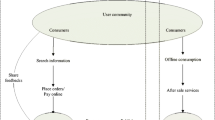Abstract
With the rapid development of information technology, it is now fast and convenient for consumers to get food service through the O2O catering platform. Based on stimulus-organism-response (SOR) theory, this study examines how external stimulus variables (the platform’s recommendation mechanism and preferential policies, online evaluation, platform stores’ monthly sales volumes, the platform’s supervision mechanism, and contactless delivery) all affect consumers’ intention to purchase through the O2O catering platform under the inner organism intermediary variables (perceived value and perceived risk). In this study, 424 sample questionnaires were collected and the data were analyzed by structural equation model. The results show that the platform’s recommendation mechanism and preferential policies, the platform stores’ monthly sales volumes, and the platform’s supervision mechanism all positively affect consumers’ perceived value, which in turn positively affects consumers’ purchase intentions. Conversely, online evaluation, the platform stores’ monthly sales volumes, the platform’s supervision mechanism, and contactless delivery all negatively affect consumers’ perceived risk. In addition, perceived risk negatively affects consumers’ purchase intention. The findings have implications for the O2O catering platform to develop a suitable marketing strategy.
Access this chapter
Tax calculation will be finalised at checkout
Purchases are for personal use only
Similar content being viewed by others
References
The 52th Statistical Report on Internet Development in China. https://cnnic.cn/n4/2023/0828/c199-10830.html. Accessed 28 Aug 2023. (in Chinese)
Shi, C.Y., Pei, Y.L., Li, D.D., Wu, T.: Influencing factors of catering O2O customer experience: an approach integrating big data analytics with grounded theory. Tehnički vjesnik 28(3), 862–872 (2021)
Yang, F.X., Li, X.P., Lau, V.M., Zhu, V.Z.: To survive or to thrive? China’s luxury hotel restaurants entering O2O food delivery platforms amid the COVID-19 crisis. Int. J. Hosp. Manag.Manag. 94, 102855 (2021)
Shankar, A., Jebarajakirthy, C., Nayal, P., Maseeh, I.H., Kumar, A., Sivapalan, A.: Online food delivery: a systematic synthesis of literature and a framework development. Int. J. Hosp. Manag.Manag. 104, 103240 (2022)
Pan, H., Ha, H.Y.: The moderating role of mobile promotion during current and subsequent purchasing occasions: the case of restaurant delivery services. Int. J. Contemp. Hosp. Manag.Manag. 34(2), 601–622 (2022)
Zeithaml, V.A.: Consumer perceptions of price, quality, and value: a means-end model and synthesis of evidence. J. Mark. 52, 2–22 (1988)
Bauer, R.A.: Consumer Behavior as Risk Taking. American Marketing Association, Chicago, IL, USA (1960)
Liu, H., Zhao, H.: Research on purchase intention of mobile terminal based on takeout apps. Manage. Rev. 33(2), 207–216 (2021). (in Chinese)
Mehrabian, A., Russell, J.A.: An Approach to Environmental Psychology. The MIT Press, Cambridge (1974)
Wang, T., Cui, B., Wu, Q.S., Lu, R.J., Qin, X., Pan, X.F.: Research on the influencing factors of consumers’ online takeout consumption behavior – Based on the survey data of Jiangsu Province. J. Researches Dietetic Sci. Culture 35, 15–21 (2018). (in Chinese)
Chiang, C.F., Guo, H.W.: Consumer perceptions of the Michelin Guide and attitudes toward Michelin-starred restaurants. Int. J. Hosp. Manag.Manag. 93, 102793 (2021)
Zhang, Y.M., Su, Y.Y., Zhang, Y.Y.: Research on the impact of negative online comments on consumers’ perceived risks. J. Hebei Univ. Econ. Business 41(1), 100–108 (2020). (in Chinese)
Zhu, L.J., Zou, Y.L., Zheng, Y.Q.: Study on influencing factors of monthly sales volume of merchants settled in Meituan takeout platform. Market Modernization 22, 1–3 (2020). (in Chinese)
Huang, H.L.: Challenges for contactless online food delivery services during the COVID-19 pandemic in Taiwan: Moderating effects of perceived government response. Eval. Program Plann.Plann. 97, 102249 (2023)
Liu, J.Y., Liu, W.X., Li, J.F., Zhang, Q.L.: Research on the influence of online opinion leaders on consumers’ purchase intention based on SOR model. J. Chongqing Univ. Technol. (Soc. Sci.) 34, 70–79 (2020). (in Chinese)
Sun, L.P., Zhang, L.J., Wang, P.: Review and Prospect of online personalized recommendation research. Foreign Econ. Manage. 38(6), 82–99 (2016). (in Chinese)
Cai, R.F.: Research on Influencing Factors of consumer behavior based on SOR model – YSL “Star” marketing stimulation. Ind. Sci. Tribune 16, 90–92 (2017). (in Chinese)
Hare, J., Black, W, Babin, B.: Multivariate data analysis: a global perspective.7th edn. Pearson Education Ltd., London (2010)
Fornell, C., Larcker, D.F.: Evaluating structural equation models with unobservable variables and measurement error. J. Mark. Res. 18, 39–50 (1981)
Guo, Z.Y., Yao, Y., Chang, Y.C.: Research on customer behavioral intention of hot spring resorts based on SOR model: the multiple mediation effects of service climate and employee engagement. Sustainability 14(14), 8869 (2022)
Author information
Authors and Affiliations
Corresponding author
Editor information
Editors and Affiliations
Rights and permissions
Copyright information
© 2024 The Author(s), under exclusive license to Springer Nature Switzerland AG
About this paper
Cite this paper
Liu, Y., Liao, T., Chen, J., Ye, C. (2024). Consumers’ Intention to Purchase Through the O2O Catering Platform: A Study Based on a Stimulus-Organism-Response (SOR) Model. In: Tu, Y.P., Chi, M. (eds) E-Business. New Challenges and Opportunities for Digital-Enabled Intelligent Future. WHICEB 2024. Lecture Notes in Business Information Processing, vol 515. Springer, Cham. https://doi.org/10.1007/978-3-031-60264-1_22
Download citation
DOI: https://doi.org/10.1007/978-3-031-60264-1_22
Published:
Publisher Name: Springer, Cham
Print ISBN: 978-3-031-60263-4
Online ISBN: 978-3-031-60264-1
eBook Packages: Computer ScienceComputer Science (R0)




